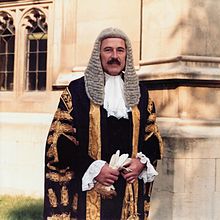Robert Goff, Baron Goff of Chieveley
|
The Right Honourable The Lord Goff of Chieveley PC FBA |
|
|---|---|

The Lord Goff of Chieveley when an appellate judge
|
|
| Senior Lord of Appeal in Ordinary | |
|
In office 1 October 1996 – 30 September 1998 |
|
| Monarch | Elizabeth II |
| Preceded by | The Lord Keith of Kinkel |
| Succeeded by | The Lord Browne-Wilkinson |
| Lord of Appeal in Ordinary | |
|
In office 6 February 1986 – 30 September 1998 |
|
| Succeeded by | The Lord Hobhouse of Woodborough |
| Personal details | |
| Born |
Robert Lionel Archibald Goff 12 November 1926 Kinloch, Perthshire, Scotland |
| Died | 14 August 2016 (aged 89) Cambridge, England |
| Nationality | British |
| Alma mater | University of Oxford |
| Occupation | Judge |
| Profession | Barrister |
Robert Lionel Archibald Goff, Baron Goff of Chieveley, PC, FBA (12 November 1926 – 14 August 2016) was a British judge and law lord.
In his obituary, The Telegraph referred to his "unbroken series of successes" in reference to his "glittering legal career".
Lord Goff, High Steward of the University of Oxford, retired in 1998 as the Senior Law Lord after more than a decade as a Lord of Appeal in Ordinary (Law Lord) in the House of Lords. Prior to being created a Law lord and receiving a life peerage as Baron Goff of Chieveley of Chieveley in the County of Berkshire on 6 February 1986, Robert Goff was born and raised in Perthshire. From an early age he had a love of scottish reeling, for which his mother acquainted him with the local farmers. His father an Army Officer wanted young Robert to join the army, yet he quickly showed that he was precociously intelligent. Educated at St Aubyn's School Rottingdean and Eton College, he left in 1944 to spend the next four years in his father's regiment, the Scots Guards, where he grew a trademark military moustache. He went up to New College, Oxford after the war, where he took a first class honours degree in jurisprudence. In 1951 he was called to the Bar at Inner Temple, but remained at Oxford as a tutor and fellow for Lincoln College. He bought a typewriter and began recording his wartime experiences in legal terms. It was twenty years before The Law of Restitution, a massive tome of immense scholarship finally appeared in print in 1966. A Herculean task of formidable intellect, the analysis was a focus on repairing the damage of war in Europe through the philosophical metaphor of contract law. Making and breaking deals and bargains had brought Europe into conflicts of interest, collapsing the normal juridical process of trial and testing the validity of contracts and the remedies for restoring equity. The work broke new ground on the equitable doctrine of the restitutionary principles, was widely used by City lawyers, judges and barristers alike. Its academic prong was provided by Gareth Jones, a Cambridge law professor in which they explored the doctrine of "unjust enrichment", greatly expanding the conceptual meaning of equity in civil cases, its wider application implied greater transparency for rectification of wrongs done by commercial entreprises, and profound impact on the expansion of city institutions, for it touched on areas like insurance, pensions and fiduciary duties, as well as into the criminal law of fraud.
...
Wikipedia
